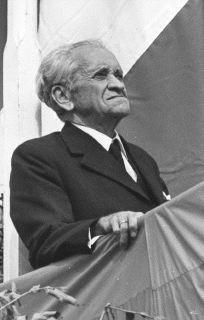Manuel de Irujo facts for kids
Quick facts for kids
Manuel de Irujo Ollo
|
|
|---|---|
 |
|
| Minister of Justice | |
| In office 17 May 1937 – 10 December 1937 |
|
| Preceded by | Juan García Oliver |
| Succeeded by | Mariano Ansó Zunzarren |
| Personal details | |
| Born | 25 September 1891 Estella, Spain |
| Died | 1 January 1981 (aged 89) Bilbao, Spain |
| Occupation | Lawyer |
Manuel de Irujo Ollo (born September 25, 1891 – died January 1, 1981) was an important lawyer and politician from Navarre, Spain. He became a leader of the Basque Nationalist Party during the time of the Second Spanish Republic. He believed strongly in democracy and his Christian faith. During the Spanish Civil War (1936–1939), he served as the Minister of Justice in 1937. After the war, he had to leave Spain and live in exile. He returned in 1977 and was elected to the Senate, a part of the Spanish parliament.
Contents
Manuel de Irujo's Life Story
Early Years and Education (1891–1918)
Manuel de Irujo Ollo was born in a town called Estella in Navarre, Spain, on September 25, 1891. His father, Daniel Irujo Urra, was also a lawyer and a professor. Manuel's family had lived in Navarre for a very long time.
He grew up learning about liberal ideas, Catholic beliefs, and Christian-democratic principles. He studied Philosophy and Law at the University of Deusto. Later, he earned a special degree called a doctorate from the University of Salamanca. In 1908, he joined the Basque Nationalist Party (PNV). After his father passed away, Manuel returned to Estella. He started his own law practice there. He got married, but sadly, his wife died in 1918.
Becoming a Provincial Politician (1919–1932)
In 1919, Irujo was chosen to be a "provincial deputy" for Navarre. This meant he represented the region in its local government. He served as a provincial deputy from 1921 to 1923. He tried to pass a law that would help farmers buy land, but it didn't succeed because landowners were against it.
He also helped create the Navarre Savings Bank. In 1923, he was re-elected, but he lost his position when Miguel Primo de Rivera became a dictator. Irujo was even put in prison for a short time. After the dictator resigned in 1930, Manuel de Irujo rejoined the Navarre government for almost a year. He was also part of the Society of Basque Studies, which focused on Basque culture and history.
Serving as a National Deputy (1933–1939)
In 1933, Irujo was elected as a "deputy" for Gipuzkoa. This meant he was a representative in the national parliament of Spain. In 1934, he defended Basque towns in court. He had also been involved in a rebellion that year. In 1936, he was re-elected to parliament.
When the Spanish Civil War began in July 1936, Irujo supported the legal government against the military uprising. He helped in talks that led to the surrender of a military base in San Sebastián. He also played a key role in the Basque Militias, which were groups fighting for the Republic. He wanted a Basque government to be formed right away.
In September 1936, the Basque Nationalist Party joined the Republican government. Irujo became a "Minister Without Portfolio" on September 26, 1936. This meant he was a minister but didn't have a specific department. The Basque Statute, which gave more self-rule to the Basque Country, was approved soon after.
On May 17, 1937, Irujo was appointed Minister of Justice. He worked to make the justice system fair and normal again. He accepted this job on the condition that people's freedom of belief was respected. He also wanted to help free priests and religious people who had been imprisoned. He resigned as Minister of Justice in December 1937 because he disagreed with how emergency courts were being used. He then served again as a Minister Without Portfolio until August 1938. He resigned from the government completely in August 1938 because, as a Christian, he was against the death penalty.
Life After the War (1939–1981)
After the Republic lost the war in 1939, Irujo went into exile, meaning he had to leave Spain. He became a leader of a group called the International League of Friends of the Basques. During World War II (1939–1945), he led the Basque National Council in London for a time. He even signed an agreement with General Charles de Gaulle about the future of Europe.
Irujo suggested creating a Basque Republic as a neutral area between France and Spain. He also helped found the Cultural Union of the Countries of Western Europe. He believed in a united Europe and joined the Union of European Federalists. In 1945, he helped write a plan for an "Iberian federation," which would bring together the nations of Portugal, Spain, Catalonia, and the Basque Country. He served as a minister in the Republican government in exile for several years.
Irujo continued to work for a federal Europe. On March 25, 1977, he finally returned to Spain after many years in exile. He was elected as a senator for Navarre. In 1979, he was also elected to the provincial parliament of Navarre. Manuel de Irujo Ollo passed away on January 1, 1981, when he was 89 years old.
Images for kids
See also
 In Spanish: Manuel de Irujo para niños
In Spanish: Manuel de Irujo para niños
 | Janet Taylor Pickett |
 | Synthia Saint James |
 | Howardena Pindell |
 | Faith Ringgold |


